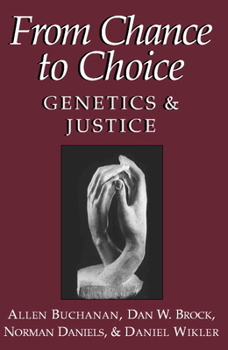From Chance to Choice: Genetics and Justice
Select Format
Select Condition 
Book Overview
This book, written by four internationally renowned bioethicists and first published in 2000, was the first systematic treatment of the fundamental ethical issues underlying the application of genetic technologies to human beings. Probing the implications of the remarkable advances in genetics, the authors ask how should these affect our understanding of distributive justice, equality of opportunity, the rights and obligations as parents, the meaning...
Format:Paperback
Language:English
ISBN:0521669774
ISBN13:9780521669771
Release Date:November 2001
Publisher:Cambridge University Press
Length:414 Pages
Weight:1.10 lbs.
Dimensions:1.1" x 5.9" x 8.9"
Customer Reviews
3 ratings
An excellent account of how eugenics has gone from being seen as an evil to being acceptable
Published by Thriftbooks.com User , 15 years ago
This book is dense and intellectually rigorous. It allows the reader to understand the history of eugenics - how the concept has been shaped and used by many different people and many different agendas over the last two hundred years. My only concern is that it lacks an understanding of the implications of genetic screening and enhancement in the real lived world - that while it may argue there a few ethical and "justice" hurdles in the way of using the knowledge gained from the study of genetics - it does not account for how such changes would impact the lives of real people. It is worth reading however because it demonstrates how easily we have come to accept the ideas put forward by geneticists as to the benefits of genetic screening and illustrates the assumptions many geneticists make about the lives of people disability. That is that many (not all) but many are better off not lived. And that the emphasis should be on prevention rather than cure.
The best book for understanding egalitarian eugenics.
Published by Thriftbooks.com User , 23 years ago
Every person born is a highly probabilistic creature, having been randomly put together by a chance selection from twenty-three chromosomes from each parent. The combinatorial variation is remarkable even in extremely homogeneous populations, and even more so in multicultural populations where there are great disparities in the average abilities of different groups. Blacks excel in sports of speed leading to their total dominance in professional sports. Jews excel in verbal intelligence leading to their remarkable dominance in law, academics, politics, and the media. And other groups fall in between these group-based genetic differences. However, it is evident throughout this book that these issues will not be dealt with honestly and directly. They will be tip-toed around, especially intelligence.This book ignores the more communitarian morality of Asian countries and/or western particularistic moral theories. They do take it up in Appendix II, "Methodology." There they state simply that a communitarian moral theory only exists as a condemnation of liberalism -- it does not attempt to put forth its own communitarian moral theory as rigorously as has been put forth by liberalism or a Rawlsian theory. Notice the irony here, that the same charge can be made against those (Gould, Lewontin, Rose, Kamin, et al.) who claim that there is no difference in the average intelligence of races or that genes do not matter. They also, like the communitarian moralists, have only attacked empiricists who have developed sociobiology and intelligence as genetically based. So now we have the kettle calling the stove black.These authors are concerned that society will become more stratified with regards to genetic capital by various groups. That is, the well-to-do will be able to use genetic engineering to eliminate unwanted genes as well as enhance their children's potential by inserting new "improved" genes into their genetic code -- including altering the germ line genes that will be carried on to successive generations. Is this a fair criticism? Not really, because this is how evolution progresses and it has already occurred as I stated above. Groups, because of breeding are not the same. Again, using the example of Ashkenazi Jews or east Asians who dominate the economies of south Asian countries, multiculturalist societies are already made up of groups who are not equal. Ashkenazi Jews have and average IQ of 117 and live among populations with an average IQ of 100. Malaysians have an average IQ of 90 with a troublesome east Asian minority, that will not assimilate, and has an average IQ of about 106 that dominates the economy. Australians have a troublesome minority of aborigines with a low IQ. These and many other examples show that there is nothing new about some groups eugenically rising above other groups, in terms of intelligence at least. But now that we have new tools at our disposal, those of us who would like to acquire the high intelli
Ethics, Eugenics and the human genome
Published by Thriftbooks.com User , 24 years ago
This book addresses all of the neccessary details of the social ramafications involved with our knowledge of the human genome. In this book, the heart wrenching accounts of America's eugenic movement are powerful enough to move anyone to become actively involved in the issues at hand. A real eye opener, one which makes it painstakingly clear that we are not prepared to deal with the information that we have aquired about ourselves and eachother.






